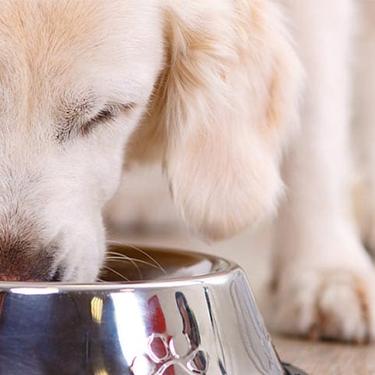
-
Find the right food for your pet
Take this quiz to see which food may be the best for your furry friend.
Find the right food for your pet
Take this quiz to see which food may be the best for your furry friend.
Featured products
 Small & Mini Savory Stew with Chicken & Vegetables Dog Food
Small & Mini Savory Stew with Chicken & Vegetables Dog FoodA delicious complement to the nutrition of Science Diet Small & Mini 7+ dog food
Shop Now Adult Healthy Cuisine Roasted Chicken, Carrots & Spinach Stew Dog Food
Adult Healthy Cuisine Roasted Chicken, Carrots & Spinach Stew Dog FoodDelicious roasted chicken paired with tender vegetables in a succulent stew
Shop Now Adult 7+ Perfect Digestion Chicken, Whole Oats & Brown Rice Recipe Dog Food
Adult 7+ Perfect Digestion Chicken, Whole Oats & Brown Rice Recipe Dog FoodScience Diet's breakthrough nutrition supports ultimate digestive well-being & healthy microbiome for dogs age 7+
Shop NowFeatured products
 Adult 7+ Tender Tuna Dinner Cat Food
Adult 7+ Tender Tuna Dinner Cat FoodWith delicious chunks in a decadent gravy
Shop Now Adult Savory Entrée Can Variety Pack Cat Food
Adult Savory Entrée Can Variety Pack Cat FoodPrecisely balanced nutrition with the delicious taste of savory minced chicken to help fuel the energy needs of cats during the prime of their life
Shop Now Adult 7+ Senior Vitality Chicken & Vegetable Stew Cat Food
Adult 7+ Senior Vitality Chicken & Vegetable Stew Cat FoodImproves Everyday Ability to Get Up & Go
Shop Now -
Dog
- Dog Tips & Articles
-
Health Category
- Weight
- Food & Environmental Sensitivities
- Urinary
- Digestive
- Joint
- Kidney
-
Life Stage
- Puppy Nutrition
- Adult Nutrition
- Senior Nutrition
Cat
- Cat Tips & Articles
-
Health Category
- Weight
- Skin & Food Sensitivities
- Urinary
- Digestive
- Kidney
-
Life Stage
- Kitten Nutrition
- Adult Nutrition
Featured articles
 Does My Pet Hate Me?
Does My Pet Hate Me?Learn tips for bonding with your pet if you've ever thought, 'My dog doesn't like me, or 'Why do I have a standoffish cat?'
Read More Why Are Dogs and Cats So Cute?
Why Are Dogs and Cats So Cute?If waggy puppy dog tails and furry kitten yawns make you swoon, you're not alone. Why are cats so cute? And, dogs too! Let's find out!
Read More Do Dogs and Cats have Belly Buttons?
Do Dogs and Cats have Belly Buttons?Learn whether cats & dogs have belly buttons like humans, what the function is, and if there are any health concerns associated with it.
Read More -


Humans have the amazing ability to recognize the facial and body cues of anxiety in other human beings, but do you know how to read the signs of stress in dogs? When dealing with canine companions, it's of the utmost importance that you're able to understand their methods of communicating tension. Once you're speaking the same "language," you can employ several methods of stress relief for dogs that'll put their mind at ease.
What Does Stress in Dogs Look Like?
Stress isn't always easy to diagnose in our human counterparts, so you can imagine how difficult it can be to recognize in your dog that can't tell you they're stressed, so it's important to look for the signs of anxiety in dogs. When a dog's anxiety is overlooked, it can lead to a multitude of unwanted behaviors that may harm the relationship between you two. Unfortunately, simply addressing the behavior problems doesn't always remove all unwanted behaviors. If you don't address the source of your dog's anxieties, these behaviors can continue manifest. While bad behaviors may still occur, looking to address your dog's stress can go a long way to reducing them.
Learning the signs of stress in dogs is the first step to fostering a fulfilling and happy bond with your pup. Some common signs of stress in dogs, according to the American Animal Hospital Association, include:
- Loss of appetite
- Avoidance and apathy
- Digestive trouble such as vomiting, diarrhea or increased flatulence
- Excessive licking and chewing, sometimes to the point of self-mutilation
- Seeking constant attention or contact
- Destructive behavior (such as chewing up furniture, pillows, shoes, etc.)
- Crouched body posture with body lowered, tail tucked and ears back
- Mouthing, which can range from nibbling to snapping or biting
- Increased or altered sleeping patterns
- Increased vocalizations
- A tense body, panting, trembling and tight muscles
- Excessive shedding
- Increased patrolling and sniffing
- Urination or defection accidents
- Abnormal, repetitive behaviors such as tail chasing, chewing paws or licking lips
- A grimace that appears as a smile
Common Causes of Stress in Dogs
Just like with humans, change is a stressor for dogs, and some struggle more than others to adapt. Additionally, exposure to unfamiliar people, places or animals; or, on the opposite end of the spectrum, separation from familiar people, places or animals can cause your dog to feel anxious or stressed. According to the Merck Veterinary Manual, other common causes of stress include loud noises, such as thunderstorms and fireworks, punishment and a lack of physical exercise or mental stimulation.
Also, did you know that pain and stress can often manifest as similar signs in dogs? If you believe that your dog is stressed, they might actually be in pain. For this reason, if you notice any of the above signs, you should bring your dog to the veterinarian to get a checkup. The last thing you want to do is simply treat the symptoms, when there is a larger underlying health condition to be concerned with.
Finally, did you know that you can be a cause of your dog's stress? Now it's not what you're thinking. Dogs are great at mirroring the emotions of their owners — so in other words, if your are stressed, your dog could be picking up on that anxiety causing them to be stressed as well. If you notice your dog's behavior has changed lately, it might be worth examining any changes in your own life. If you are worried about work, relationships or a move, you might not realize that you are transferring those worries to your dog. A good method to overcome these anxieties is to just spend time bonding with your dog and assure them everything is okay — in fact, chances are that this may help ease some of your stress too.



Tasty Tips
Calming Products for Dogs
Many items are available online and in pet stores that are specifically designed to help pet parents provide stress relief for dogs.
These include products containing dog appeasing pheromone (DAP), which mimics the pheromones of a canine nursing mother for a stress-relieving effect. It can be found in a variety of items, such as collars, plug-in diffusers, wipes and sprays.
Storm capes and calming vests may also offer relief to anxious pooches. The theory is that gentle pressure helps calm down dogs during anxiety-triggering situations. Storm capes even help discharge static electricity that builds up during storms to provide further comfort to dogs.
Certain supplements and pharmaceuticals may also provide stress relief for dogs, including:
- Solliquin: A supplement containing plant extracts that can help promote a calming effect.
- Zylkene: A supplement that can be used long term or short term to ease anxiety. It can be administered two days before a stressful event to ease anxious behaviors.
- Sileo: A Food and Drug Administration-approved medication for the treatment of canine noise fears. It can be taken alone or with other anxiety medications or supplements.
While your vet may recommend supplements, know that there are other options as well. For instance, there are therapeutic pet foods out there that are formulated with stress-alleviating ingredients in them as well. Something as simple as changing their food could go along way at helping them ease anxiety.
The list of prescription medications and antidepressants available for dogs with generalized anxiety and stress disorders is always growing. If you think your dog may benefit from one of these options — or from medication, in general — schedule a visit with your veterinarian to determine the best course of action.
Best Practices for Stress Relief in Dogs
Beyond medication, there are some additional things you can try with your dog as part of a more holistic stress-relief program. Consider trying any of the following:
- Scheduling regular exercise and playtime with them. Note: Daily walks may not be enough.
- Avoiding situations and places that are known to trigger stress whenever possible. Taking your dog to a crowded place such as an outdoor festival or farmers market, while well-intentioned, may end up stressing them out.
- Providing a safe zone. This can be wherever they feel comfortable, from a bed to doghouse. Giving them a sweatshirt or blanket that smells like you can go a long way toward easing anxieties when you're out of the house.
- Setting consistent rules and not changing them. Your dog must know what you expect from them. And don't forget to reward positive behavior and ignore bad behavior. If you always run to your dog's rescue when they seem stressed, they will pick up on this and use it to their advantage. Part of being a pet parent is learning when you need to consul them versus when it's only reinforcing a bad behavior.
- Providing them with a complete and balanced food to promote their well-being — body and mind.
It's important to understand, that not all anxious behaviors in dogs can be cured, so to speak. Much like humans, some anxiety-related behaviors are lifelong, and as their pet parent, it is your job to help them manage them the best you can. Above are a number of possibilities for treating stress in dogs, but your veterinarian will be able to best determine the cause of the anxiety and the course of treatment. Understanding this is important, as is how you respond to their stress-specific behaviors. Try to remain calm around your dog, rewarding good behavior, while avoiding scolding or punishing them for unwanted behaviors.


Dr. Laci Schaible is a small animal veterinarian, veterinary journalist, and a thought leader in the industry. She received her Doctor of Veterinary Medicine from Texas A&M University and her Masters in Legal Studies from Wake Forest University.
Related products
Related articles

Proper nutrition for your pregnant or nursing dog is vital to her and her puppy's health. Learn what you should do provide her with the proper nutrients.

Learn how today's wet dog food blends have gotten a face lift, and how you'll provide your dog the nutrition he needs in the form he loves.

Learn about choosing the right dog food to help ensure your adult dog will receive the correct balance of nutrition.

Learn the the dangers of feeding your dog chocolate, which types are most dangerous, and what to do if you discover that they have consumed chocolate.

Put your dog on a diet without them knowing
Our low calorie formula helps you control your dog's weight. It's packed with high-quality protein for building lean muscles, and made with purposeful ingredients for a flavorful, nutritious meal. Clinically proven antioxidants, Vitamin C+E, help promote a healthy immune system.
Put your dog on a diet without them knowing
Our low calorie formula helps you control your dog's weight. It's packed with high-quality protein for building lean muscles, and made with purposeful ingredients for a flavorful, nutritious meal. Clinically proven antioxidants, Vitamin C+E, help promote a healthy immune system.

